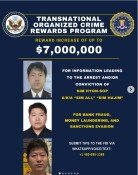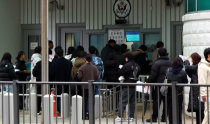N.Korea pushing free market reforms: Radio Free Asia
N.Korea pushing free market reforms: Radio Free Asia
Posted August. 10, 2012 07:52,
North Korea is concretely pushing for economic reform measures, a move seen as a bid by leader Kim Jong Un to appease his people, who are starving and struggling amid poverty, and to consolidate his power base.
Citing sources in North Korea, Radio Free Asia of the U.S. said Thursday, Lectures on a new economic management system have been held targeting various labor organizations, factories and companies since Aug. 6, adding, The lectures are about independent production by factories and companies, and how to set prices and sell products. The network added, This means that North Korea has given up a planned economy, one of the fundamentals of a socialist regime.
Citing a source in North Hamgyong Province, the report also said, The state gives out rations only to employees of government agencies, and the rationing system for other workers has been abolished, adding, North Korea has set a rule that authorities hold 70 percent of the overall harvest and farmers take the remaining 30 percent.
On this, a source at the South Korean government said, There is a chance that North Korea is implementing so-called new economic improvement measures on a trial basis, but specific details have not been confirmed.
On June 28, Kim presented an economic principle on about the establishment of our style of new economic management system, and the recent reforms have reportedly been devised in a way that follows the principle.
On July 26, South Koreas National Intelligence Service reported to the National Assembly about the Norths actions, including transfer of economic projects from the ruling Workers Party and military to the Cabinet, reduction of the number of workers deployed at collective farms, expansion of companies managerial autonomy, and a plan to raise worker salaries.
In 1996, North Korea reduced the number of workers at collective farms to expand grain production, and gave farmers the right to dispose of produce for the portion that exceeded the target. Back in 2002, Pyongyang implemented July 1 measures to improve economic management that involved adjustment of salary and price levels to reflect the economic situation, introduction of an independent profit system for companies, and the curtailing of the rationing system, before returning to the planned economy after 2005.
The South Korean government judges that the economic reforms being tried by Kim are similar in fundamental elements to measures tried in the past.
Since Kim Jong Un pledged to "ensure that the people will never have to tighten their belts again in an April 15 public speech, the North`s leader has constantly stressed the importance of economy. For the young Kim, who is less charismatic than his grandfather, North Koreas founder Kim Il Sung, and his father Kim Jong Il, and has no power base in the military, economic revival could be one solution to offset his weaknesses.
Most experts say, however, that it will be difficult for Kim Jong Un to push for radical and across-the-board economic reform. If his reform drive fails after he announces comprehensive reforms, this will come back to haunt his government as a cause of instability.
A source at the South Korean government said, The rationing system has already been a formality since long ago, but it will be difficult for the North to act in a way that can sway the fundamentals of a planned socialist economy, including revocation of the rationing system.
Goh Il-dong, chief of the Economic Information Center of the (South) Korea Development Institute, said, Economic reforms that have been announced thus far under Kim Jong Un have even failed to match the level of the July 1 (2002) measures, adding, Kim Jong Un seems to be juggling in-between conservative groups, including the military, which opposes reform, and North Koreans, who demand reform.
will71@donga.com shcho@donga.com





![교육부 장관인가, 교사부 장관인가[오늘과 내일/우경임]](https://dimg.donga.com/c/138/175/90/1/wps/NEWS/IMAGE/2025/12/26/133045801.1.png)

